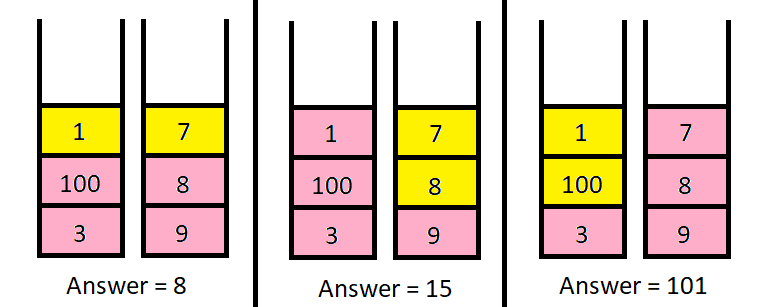There are n piles of coins on a table. Each pile consists of a positive number of coins of assorted denominations.
In one move, you can choose any coin on top of any pile, remove it, and add it to your wallet.
Given a list piles, where piles[i] is a list of integers denoting the composition of the ith pile from top to bottom, and a positive integer k, return the maximum total value of coins you can have in your wallet if you choose exactly k coins optimally.
Example

Input: piles = [[1,100,3],[7,8,9]], k = 2
Output: 101
Explanation:
The above diagram shows the different ways we can choose k coins.
The maximum total we can obtain is 101.
Solution
Great solution found here.
/**
* @param {number[][]} piles
* @param {number} k
* @return {number}
*/
var maxValueOfCoins = function (piles, k) {
// array of length k pre-filled with zeros
// each value dp[i] will denote the max value we can get with i-1 coins
let dp = Array(k).fill(0);
// for each pile
for (const pile of piles) {
const tmp = Array(k).fill(0);
let sum = 0;
for (let i = 0; i < k && i < pile.length; i++) {
// presum coin values for each pile
sum += pile[i];
for (let j = i; j < k; j++) {
// for each value in dp array
// check what max value we can get
// if we'll get i coins from the current pile
// and all the rest coins from the previous piles
tmp[j] = Math.max(
tmp[j],
dp[j],
sum + (j - i - 1 >= 0 ? dp[j - i - 1] : 0)
);
}
}
dp = tmp;
}
return dp[k - 1];
};